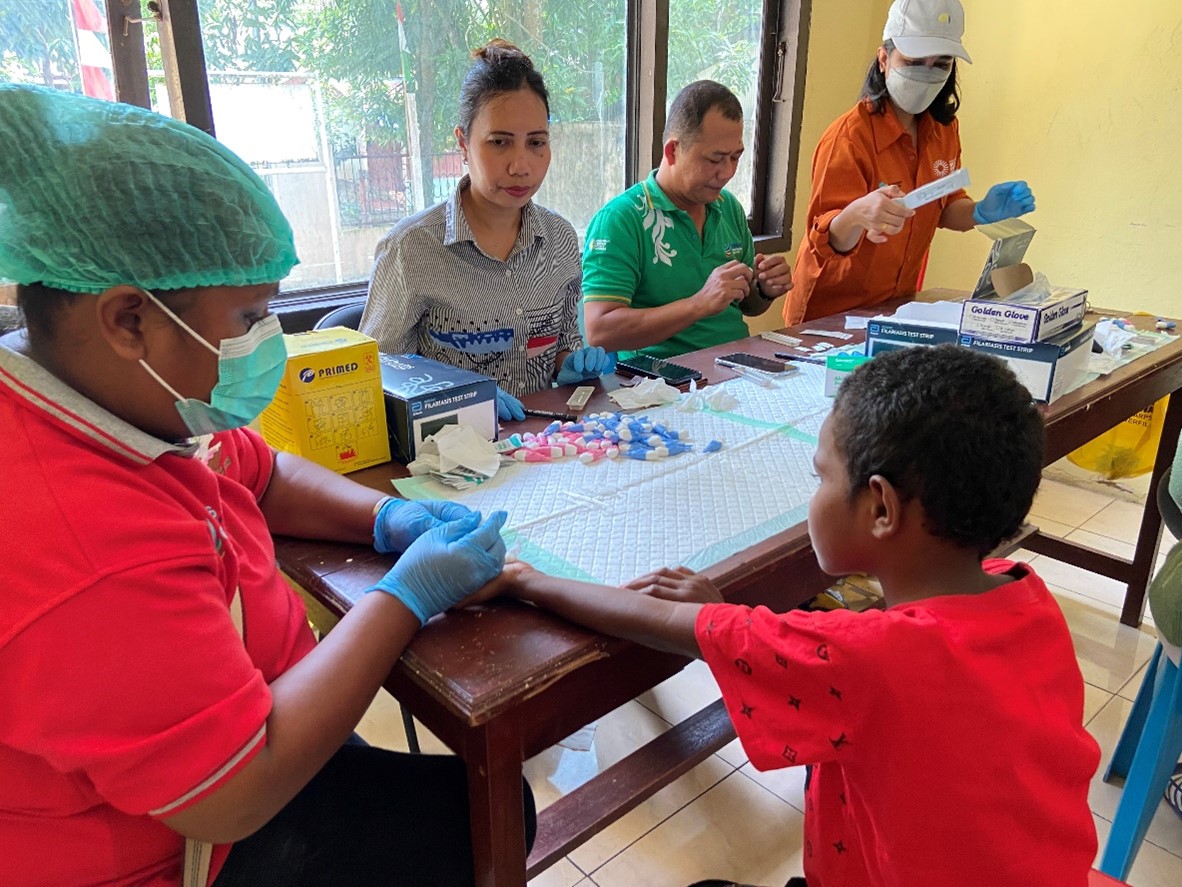Lymphatic filariasis (LF), also known as elephantiasis, is a neglected tropical disease, caused by parasitic worms transmitted through mosquito bites. It damages the lymphatic system, causing swelling in various parts of the body and can lead to lifelong disability and social stigma. Endemic in almost half of the 514 districts in Indonesia, the disease puts nearly 46% of Indonesia’s population at significant risk.
The Indonesian government has committed to eliminating filariasis by 2030, designating it a national priority in the fight against infectious diseases. Indonesia's national neglected tropical disease (NTD) programme has made impressive strides in combatting LF by initiating mass drug administration (MDA) with the drug regimen consisting of ivermectin, DEC, and albendazole (IDA) in 2019. The goal is for the MDA campaign to reach at least 65% of the population per year for five consecutive years. This initiative focuses on those areas that experience delays in conducting MDAs, fail to reduce infections or report a recurrence of LF among the population. To measure the impact of the MDA, early checks in the form of a pre-transmission assessment survey (pre-TAS) are necessary. Through these surveys, Indonesia can assess how many people still show signs of infection after successful rounds of MDA. Depending on the level of prevalence, those areas would move on to occasional, more thorough checks (periodic TAS), which in turn would offer valuable evidence of the success of the LF elimination programme.

A courageous six-year-old boy residing in Sorong City underwent blood examination with a rapid diagnostic test during the pre-TAS. Photo Credit: WHO/Agrin Zauyani Putri
WHO supported Indonesia in conducting the pre-TAS in four endemic districts, namely Sumba Barat Daya, Pekalongan City, Sorong City, and Mamuju, which had previously implemented MDA with the IDA regimen. To prepare for the survey, WHO in collaboration with the Ministry of Health organized on-the-job training as a refresher for district health officers, primary healthcare centre (Puskesmas) staff, laboratory analysts, and health cadres. The health workers practiced using rapid diagnostic tests (RDT) and the correct blood smear preparation techniques. Following the refresher session, the trained health workers carried out the survey in selected areas in each endemic district to determine if prevalence microfilaria or antigen among the population is below the threshold. Sorong City used RDT while the other districts conducted night blood surveys.
Thanks to the dedication and collaboration of all stakeholders, the pre-TAS was successfully implemented. Each district achieved the targeted number of individuals tested, totalling 2,587 people. The results showed that all districts passed the survey, with the district microfilaria rate of less than 1% or an antigen presence below 2% in the tested blood samples, both below the pre-TAS threshold. If the prevalence is higher than the threshold, the district will need to undergo at least two additional rounds of MDA.
Three individuals in Pekalongan City and two individuals in Sorong City tested positive, but the cities still passed the survey as they reported a significant reduction in LF transmission due to repeated rounds of MDA. These individuals promptly received the necessary treatment. The findings confirm that all districts meet the criteria to proceed with the periodic TAS called IDA impact survey which will determine whether an MDA can be stopped, demonstrating the effectiveness of the MDA in reducing the transmission of LF. This first IDA impact survey will be conducted in 2024.
Implementing MDA with the IDA regimen in eligible districts constitutes a strategic approach. This not only seeks to alleviate suffering but also strives to break the cycle of transmission in the fight against filariasis. Conducted after sufficient suppression of LF, TAS will mark an important milestone towards the goal of eliminating filariasis
This activity was supported by the European Union and the United States Agency for International Development (USAID)
Written by Agrin Zauyani Putri, National Consultant for Neglected Tropical Diseases; and Achmad Naufal Azhari, National Professional Officer for Neglected Tropical Diseases; WHO Indonesia
